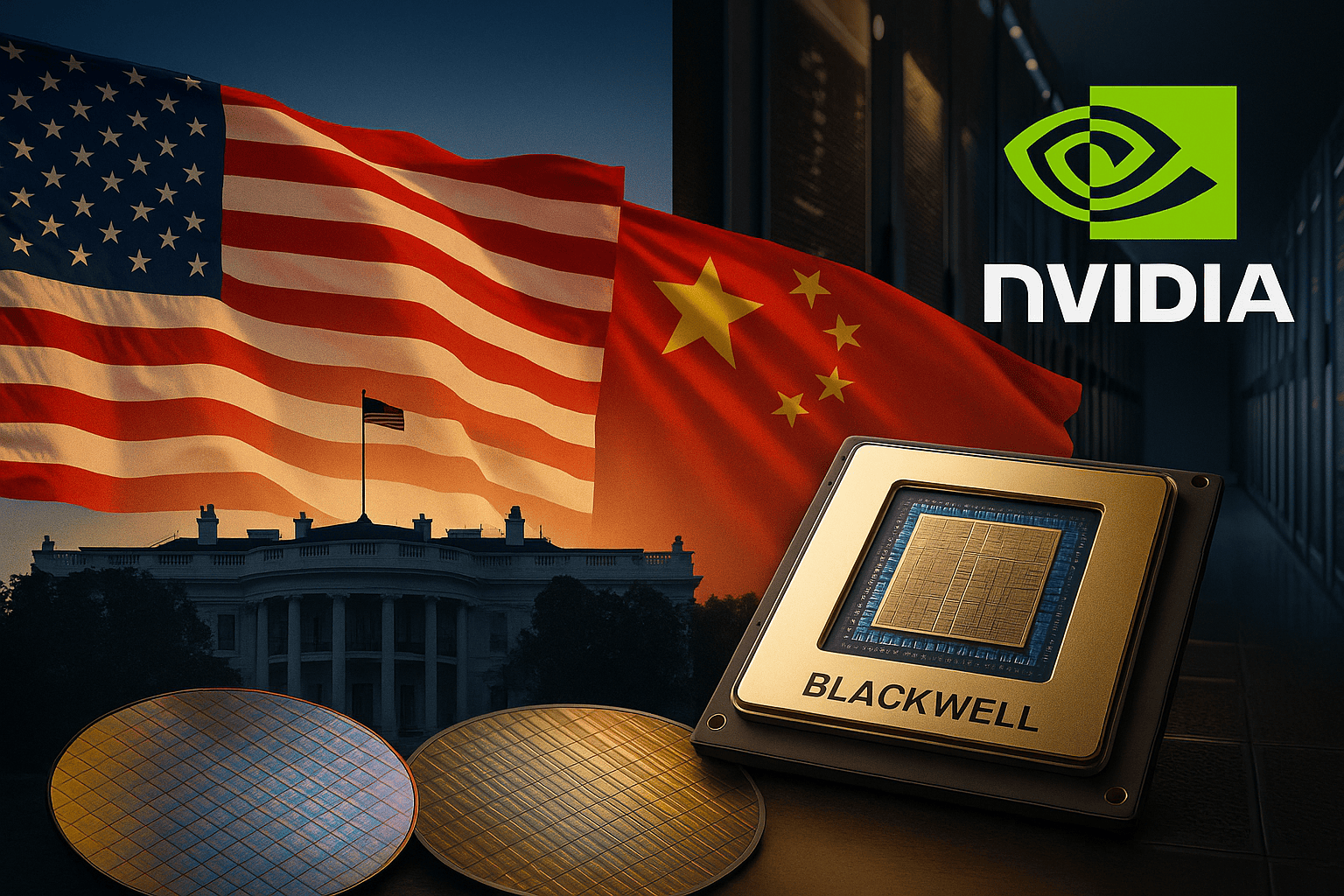Trump Bars Nvidia Blackwell AI Chips From Others
By Tredu.com • 11/3/2025
Tredu

What happened
President Donald Trump said Nvidia’s most advanced Blackwell AI chips will be kept for American customers, stating that the top tier will not be sold to China or unspecified “other people.” The remarks, made in a televised interview and to reporters while traveling, point to a stricter posture than some investors had expected after hints of a possible path for scaled-down exports. Markets read the comments as a signal of tighter screening on state-of-the-art accelerators.
The policy context
Trump’s statement lands amid a rolling review of export rules that has shifted from performance thresholds toward license decisions case by case. In recent days, the administration and lawmakers aired concerns that even cut-down parts could meaningfully boost China’s compute capacity. Reuters reporting also noted that the president previously praised Blackwell as a “super-duper” chip and weighed, then downplayed, the idea of discussing it with China’s leadership. The new language tightens expectations.
What it could mean for Nvidia
Nvidia has told partners it hopes to sell into China where permitted, yet decisions rest with Washington. The company has not sought licenses for top Blackwell units given China’s stance toward the firm, according to prior reporting. If the ceiling on performance is fixed high enough, China revenue would remain capped, shifting Nvidia’s near-term growth mix toward the U.S. and selected allies. If downgraded variants get limited approval, Nvidia could protect some share but still face tighter margins and complex product planning.
Scope for exceptions
Trump’s phrasing left a narrow opening for lesser versions of Blackwell outside the U.S., a carve-out that has featured in past debates. Analysts say the line between safe and sensitive can blur, since even halved performance at scale can close capability gaps. Any exception is likely to involve quantity caps, end-use checks, and government-to-government oversight, raising compliance cost and time to revenue.
Impact on China and regional supply chains
A firmer block on top Blackwell parts would sustain pressure on China’s access to leading accelerators, reinforcing domestic substitution drives in chips, packaging, and cluster software. North Asian supply chains could see mixed effects. Korean and Taiwanese firms rely on U.S. silicon for data center builds, but also ship components into Chinese systems. If top chips remain U.S.-only, allied buyers may secure more supply for local projects, while China leans harder into homegrown alternatives and networking workarounds.
What allies will watch
Allies will parse whether the U.S. erects a clear lane for purchases by trusted partners. Prior discussion of licenses and government agreements hinted at a framework that distinguishes allies from strategic competitors. Clarity would help national AI programs schedule power, real estate, and procurement for 2026–2027 campuses built around Nvidia’s Blackwell systems. Absent guidance, buyers may over-order current generation parts to reduce timing risk.
Industry reaction and market read-through
Hardware makers, cloud providers, and integrators will rework roadmaps if Blackwell distribution narrows. U.S. oriented demand could pull forward orders for racks, power gear, and optical links. Software vendors may see a larger U.S. skew in early Blackwell deployments, shaping where foundation-model training and inference benchmarks are set. For listed names, revenue recognition hinges on export approvals, lead times, and how quickly facilities can take delivery.
Legal and enforcement angles
Expect stricter end-use due diligence, expanded denied-party lists, and deeper audits for resellers and cloud services that might offer indirect access. Enforcement agencies have emphasized diversion risks through third countries. Penalties and reputational risk are high, so boards will demand stronger controls and clearer documentation. The policy arc suggests fewer bright-line speed limits, more licensing discretion.
Jensen Huang’s calculus
Nvidia’s CEO has argued that rigid curbs can undercut U.S. competitiveness if they accelerate substitute ecosystems abroad. Management now must balance policy compliance with product cadence and capacity allocations. If U.S. demand absorbs early Blackwell supply, financial impact could be neutral to positive near term. Over a longer horizon, the size of reachable non-U.S. markets, including for older architectures, will shape revenue diversity.
Key uncertainties
Three variables will decide how binding the policy is. First, the exact definition of “most advanced” in regulatory text, which determines where the cutoff sits in the Blackwell stack. Second, the scope and speed of any allied licensing regime. Third, China’s progress on domestic accelerators and system integration. Each factor affects pricing power, delivery schedules, and the competitive field for model training.
Bottom line
Trump bars Nvidia Blackwell AI chips from others, signaling a firmer ceiling on cutting-edge exports to China. The policy narrows where the most powerful accelerators will run, shifts near-term demand toward the U.S. and allies, and leaves markets watching for the fine print that will govern exceptions, timing, and enforcement.

How to Trade Like a Pro
Unlock the secrets of professional trading with our comprehensive guide. Discover proven strategies, risk management techniques, and market insights that will help you navigate the financial markets confidently and successfully.


